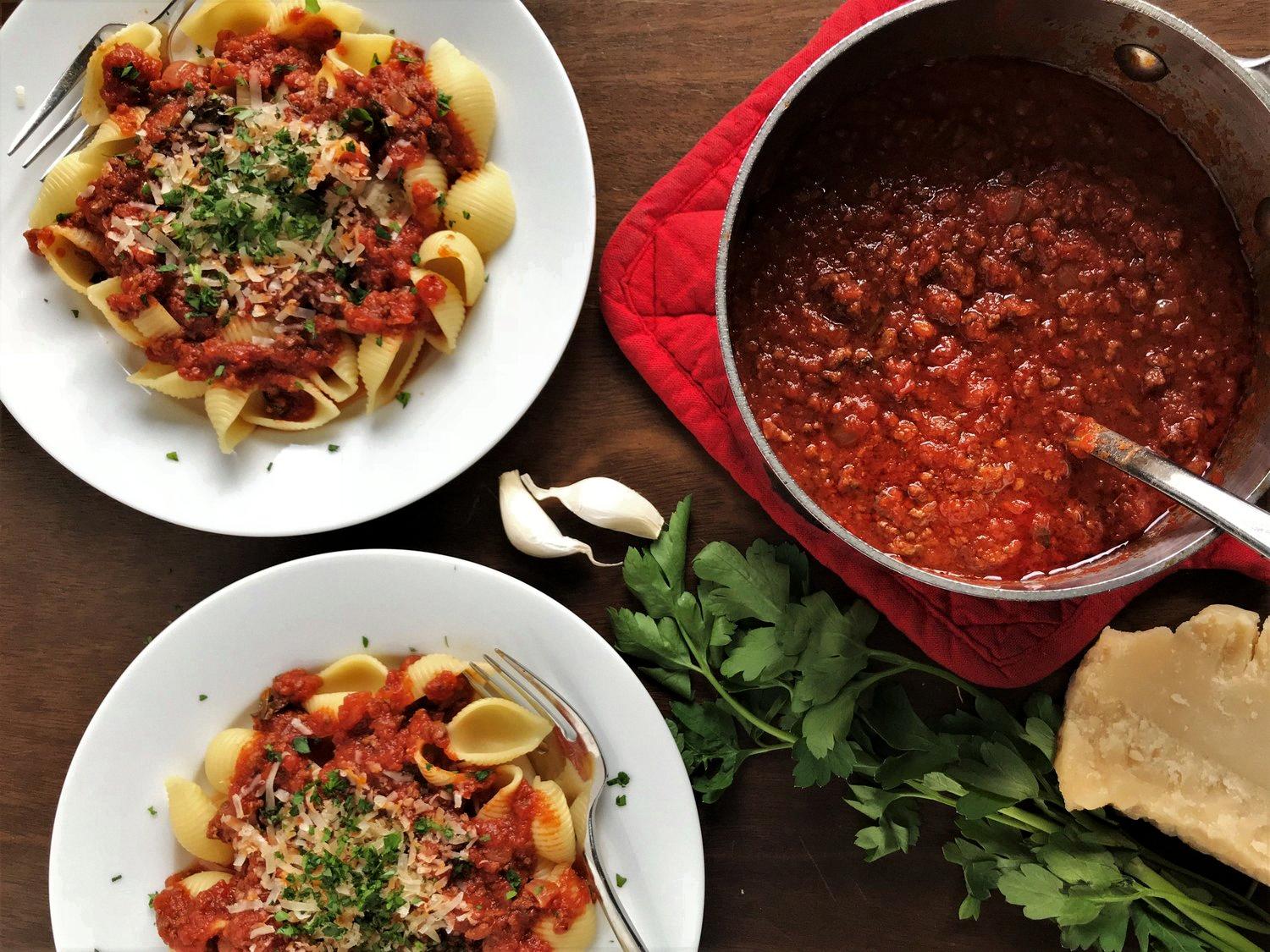Ragu alla Bolognese, commonly known as Bolognese sauce, is a classic Italian meat-based sauce that is commonly served with pasta. This rich and flavorful sauce is made with ground meat, tomatoes, vegetables, wine, and beef broth. One of the key ingredients in Bolognese sauce is wine, which adds depth and complexity to the dish.
When it comes to choosing wine for Bolognese sauce, red wine is the traditional choice. Red wine with plenty of tannin and acidity is best for a meaty and hearty sauce like Bolognese. These wines include Chianti, Montepulciano, Barbera, and pinot noir. The tannins in red wine help cut trough the richness of the meat and add structure to the sauce. The acidity also helps balance the sweetness of the tomatoes and adds brightness to the dish.
White wine, on the other hand, often works just as well as red if you’re trying to add a little flavor and depth to tomato sauce. While red wine bumps up the richness for a more robust sauce, white wine contributes a delicate fruity flavor that’s unexpected and often delightful. When choosing white wine for Bolognese sauce, it’s best to go for a dry and unoaked wine such as Pinot Grigio, Sauvignon Blanc or Chardonnay.
However, it’s important to note that the wine you choose should complement the other ingredients in the dish as well. For example, if you’re using a lot of herbs and spices in your Bolognese sauce, you may want to opt for a wine with similar flavors such as a Sangiovese or a Syrah. If you’re using a lot of tomatoes in your sauce, you may want to go for a wine with higher acidity to balance out the sweetness of the tomatoes.
The wine you choose for your Bolognese sauce can make a significant difference in the overall flavor and complexity of the dish. While red wine is the traditional choice, white wine can also be a great option for adding a delicate fruity flavor to the sauce. Ultimately, the wine you choose should complement the other ingredients in the dish and enhance the overall flavor profile.
What Kind Of Wine Is In Bolognese?
Bolognese sauce is a classic Italian meat sauce that is typically made with a combination of ground beef and pork, along with aromatic vegetables and tomato-based ingredients. One of the key ingredients in Bolognese sauce is white wine, which is used to add acidity and complexity to the dish. The type of white wine used can vary depending on personal preference and availability, but dry white wines such as Pinot Grigio, Sauvignon Blanc, or Chardonnay are commonly used in Bolognese sauce recipes. The wine is typically added to the sauce at the beginning of the cooking process and is simmered with the oher ingredients to help infuse the flavors together. the addition of white wine to Bolognese sauce is an important element that helps to create a rich, savory flavor that is beloved by many Italian food enthusiasts.

Can You Put White Wine In Bolognese?
White wine can be used in Bolognese sauce, as it is a traditional ingredient in the recipe. The white wine adds a tangy and acidic flavor to the sauce, which helps to balance out the richness of the meat. However, it is important to note that the amount of wine used should be moderate, so as not to overpower the other flavors in the dish. A good rule of thumb is to use around 1/2 to 1 cup of white wine for evry 2 pounds of ground meat. It is also recommended to use a dry white wine, such as Pinot Grigio or Sauvignon Blanc, rather than a sweet wine, as this will provide the best flavor profile for the sauce.
Do Italians Use Red Wine In Bolognese?
Italians use red wine in Bolognese sauce. In fact, red wine is a crucial ingredient in this classic Italian sauce. The addition of red wine to Bolognese sauce helps to enhance the flavor of the meat, tomatoes, and vegetables used in the recipe. The acidity in the wine also helps to tenderize the meat and balance out the sweetness of the tomatoes.
When it comes to choosing the riht wine for Bolognese sauce, red wines with plenty of tannin and acidity are recommended. These wines include Chianti, Montepulciano, Barbera, and pinot noir. These wines are known for their bold flavor profiles, which pairs well with the rich and hearty Bolognese sauce.
The addition of red wine in Bolognese sauce is a key component in creating the authentic and traditional taste of this classic Italian dish.
Is Red Or White Wine Better In Spaghetti Sauce?
When it coms to choosing between red and white wine for spaghetti sauce, both options can be used depending on personal taste and preferences. Red wine, with its bold flavor and rich tannins, is traditionally used to add depth and complexity to tomato-based sauces. It pairs well with meaty pasta dishes and can give a robust flavor to the sauce.
On the other hand, white wine, with its light and fruity taste, can also be used to add a subtle flavor to spaghetti sauce. It pairs well with seafood-based pasta dishes and can provide a delicate flavor to the sauce.
Ultimately, the choice between red and white wine for spaghetti sauce depends on personal preference and the dish you are making. If you want a hearty and robust sauce, red wine would be a good choice. If you prefer a lighter and more delicate sauce, white wine would be a great option.

Conclusion
Wine is a versatile and complex beverage that can enhance our dining experiences in many ways. From pairing with different foods to being used as an ingredient in cooking, wine offers a range of flavors and aromas that can elevate any dish. Red wines with tannin and acidity are best for hearty meat dishes like Bolognese, while white wines can add a delicate fruity flavor to tomato sauces. Whether you’re a wine connoisseur or a novice, there is always something new and exciting to discover in the world of wine. With its rich history and cultural significance, wine is a timeless and beloved aspect of our culinary traditions that will continue to be enjoyed for generations to come.
